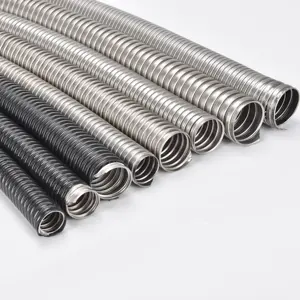
All categories
Featured selections
Trade Assurance
Buyer Central
Help Center
Get the app
Become a supplier

(572 products available)














Electrical wiring installed outdoors needs proper protection from weather, moisture, and physical damage. When exposed to the elements, rigid metal conduits easily corrode and crack over time. Outdoor flexible conduit provides a durable, adaptable solution for running and shielding electrical circuits in demanding exterior applications.
A trusty outdoor flexible conduit is needed for durable and reliable wire protection in wet, sunlit, or demanding outdoor conditions. An outdoor flex conduit refers to thin-walled wire tubing designed to protect and route electrical wiring in outdoor, wet, or damp environments. It is composed of durable, moisture-resistant materials that resist UV rays and weather extremes. The outdoor electrical wiring conduit can be bent and shaped on-site, making it easy to maneuver around obstacles. It is available in a range of sizes from 1/2-inch to 6-inch diameters to accommodate different wiring needs. Compared to rigid metal conduits, an outdoor flexible conduit better absorbs vibration, resists corrosion, and provides long-term wire protection.
There are many good reasons to use an outdoor flexible conduit rather than rigid metal. An exterior flexible conduit allows for easier installation since it bends and shapes around obstacles while wiring. It withstands vibration that can damage wiring by absorbing movement and shaking. The outdoor flexible conduit is made from nonmetallic, weatherproof materials, making it corrosion-resistant. It is highly adaptable and available in various sizes and colors. Outdoor flexible conduit options provide effective wire protection with smooth inner walls that prevent wire abrasion. The outdoor flexible conduit maintains integrity if stepped on or hit, making it crush and impact-resistant. Even in harsh conditions, it easily lasts over 30 years, giving a long service life. Good conductivity is allowed without interference with power transfer. After installation, the flexible exterior electrical conduit permits dynamic motion and movement.
A flexible conduit for outdoor use has many valuable applications. It provides long-term performance and adaptability that a traditional metal conduit cannot match. The outdoor flexible conduit may be used for connecting exterior lights, outlets, and equipment. It is also helpful for running electrical lines at hardware and lumber yards. Installers use outdoor flexible conduit options for protecting delicate wiring in carports, canopies, and pavilions. It also safeguards pool equipment wiring from moisture and landscape lighting in gardens, pathways, and lawns. Even farmers use outdoor flexible conduit options for agricultural electrical lines at fish hatcheries and farms. The outdoor flexible conduit can help deliver temporary power for outdoor events and construction.
When choosing outdoor flexible conduit, consider important factors. The material of the outdoor flexible conduit should be polyvinyl chloride (PVC) or a liquid-tight flexible conduit, which is ideal for outdoor uses. The size of the outdoor flexible conduit must match the conduit's inner diameter to the wiring size and the number of conductors. Installers must ensure that the conduit can withstand prolonged sun exposure by verifying ultraviolet resistance. Use liquid-tight fittings for watertight connections to prevent any moisture intrusion that can cause accidents. Installers can select outdoor flexible conduit units that are rated for flame retardance and fire safety. Ensure that outdoor electrical projects are safely wired by opting for an outdoor flexible conduit.